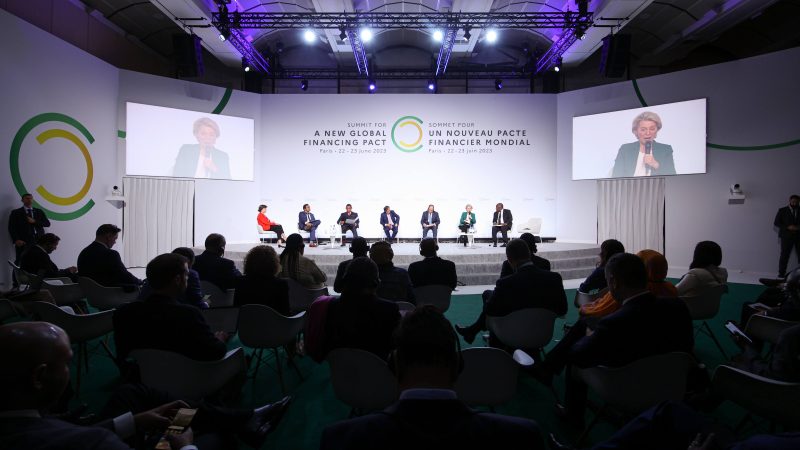Senegal struck a deal with wealthier countries on Thursday (22 June) that will see it get an initial €2.5 billion in finance to develop renewable energy and speed up its transition to a low-carbon economy.
“Senegal has committed to increasing the share of electricity generated by renewable energy to 40% by 2030 with financing to the order of €2.5 billion,” President Macky Sall told a roundtable at the two-day Summit for a New Global Financing Pact in Paris.
The Senegal Just Energy Transition Partnership (JETP) , backed by France, Germany, the European Union, the United Kingdom and Canada, comes as richer countries are urged to do more to help poorer peers in the fight against climate change.
“We are teaming up with Senegal to accelerate investments in clean energy infrastructure,” said EU Commission President Ursula von der Leyen who signed the joint declaration in Paris on Thursday.
The money will be used to help Senegal achieve its target of 40% of installed capacity from renewable energies by 2030, and a draft investment plan will be finalised within 12 months.
“We think that if this is mobilised we can achieve, if not exceed this objective,” Sall said at the Paris summit, adding that renewable energy currently accounts for 31% of Senegal’s capacity.
So-called JETPs, spearheaded by a deal with South Africa at a UN summit in 2021, have emerged as a key mechanism for mobilising public and private finance to help developing countries shift away from fossil fuels.
The first of these types of arrangements, announced at the COP26 climate conference in 2021, saw $8.5 billion promised to help South Africa wean itself off coal-fired power, but observers have raised concerns that the deal is too reliant on loans rather than grants.
Other deals with Indonesia ($20 billion) and Vietnam ($15.5 billion) followed.
Pressure on rich nations
The rich, heavy emitting nations providing the finance in these deals are increasingly under pressure to help poorer countries speed up their transition to cleaner energy and to manage the effects of climate change.
“The renewables target that Senegal have proposed is a good idea, we don’t want them to be locked into long term dependence on gas,” said Ronan Palmer, an analyst at climate think tank E3G.
“But the finance providers for Senegal’s JETP have to very carefully avoid the mistakes made in South Africa,” he added. “This should not be a mechanism for more debt.”
According to Thursday’s statement , international partners and multi-lateral development banks will mobilise the €2.55 billion for Senegal in new and additional financing over an initial period of three to five years, starting this year.
More financing may be mobilised during and beyond this period to support Senegal’s ambitions, it added.
“The current global financing system is not adequate,” said Sall, who also bemoaned the cost of credit, calling on multi-lateral development banks to take into consideration current issues such as climate change and the high debts of low-income countries.
Nations supporting the deal have also pledged to help line up funding from multilateral development banks and the private sector.
Senegal has not forsworn fossil fuel development, saying it “intends to use its natural gas resources as a transitional energy.”

Read more with EURACTIV


